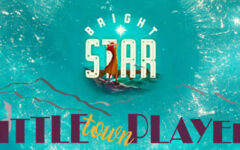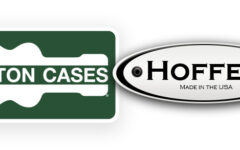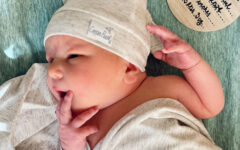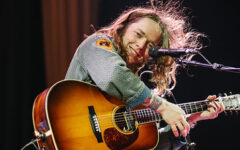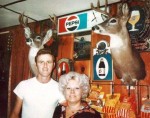 I was happy to see the headline earlier this month for a story written by my friend and current bandmate, Buckwheat Green, about one of the great bluegrass venues of days gone by, The Rose Garden Inn. However, after reading it, I felt like there was more that needed to be said.
I was happy to see the headline earlier this month for a story written by my friend and current bandmate, Buckwheat Green, about one of the great bluegrass venues of days gone by, The Rose Garden Inn. However, after reading it, I felt like there was more that needed to be said.
My feelings go beyond simply fond memories, as this was the place where I first had the opportunity to see, hear, and become friends with many of my greatest musical heroes and friends. Admittedly, I am a sentimental and nostalgic person, and so, as Paul Harvey used to say, here is “the rest of the story.”
As is the case with the world famous Station Inn, the Rose Garden Inn was a simple little “beer joint” (no liquor license), far past its prime structurally (although its wooden dance floor stood up to quite a strain when the Bluegrass Cardinals were performing), with a capacity of about a hundred, or a hundred and fifty when they covered the dance floor with additional tables and chairs. In fact, when I visited the Station Inn for the first time, my first reaction was “this isn’t any bigger or nicer than the Rose Garden.” In both cases, the importance of these venues was not based on their size, fancy decoration or furnishing, but rather for the unwavering love and respect for the music and those who play and enjoy it.
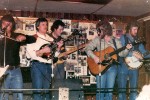 While I had heard of its existence before it became the Rose Garden Inn, my introduction and its beginning as a regular performance venue for professional bluegrass bands came in the summer of 1978. Located near Hurricane, West Virginia, it was owned by Troy and Connie Dunaway. I had been in the process of starting a new group with a couple of brothers, Joe and Jerry Vance, and we had been playing at a nearby establishment, the Highway Inn, every weekend during the spring. However, as summer and hot weather set in, we moved to the Rose Garden because they had air conditioning and the Highway Inn didn’t. In those days, a Pepsi, a sandwich, and tips, (and air conditioning) was all it took to make the Rose Garden our home away from home.
While I had heard of its existence before it became the Rose Garden Inn, my introduction and its beginning as a regular performance venue for professional bluegrass bands came in the summer of 1978. Located near Hurricane, West Virginia, it was owned by Troy and Connie Dunaway. I had been in the process of starting a new group with a couple of brothers, Joe and Jerry Vance, and we had been playing at a nearby establishment, the Highway Inn, every weekend during the spring. However, as summer and hot weather set in, we moved to the Rose Garden because they had air conditioning and the Highway Inn didn’t. In those days, a Pepsi, a sandwich, and tips, (and air conditioning) was all it took to make the Rose Garden our home away from home.
The next, and primary, player in this story is Maxine Harmon, Troy Dunaway’s sister. The Dunaway family, which was quite large, were all devoted bluegrass fans and had developed many relationships with the professional bluegrass community over the years. Troy and Connie, assisted by Maxine, decided to start presenting bluegrass in a serious way by taking the step from local musicians informally playing for tips, to instituting a cover charge and bringing in touring groups. According to Maxine, the first professional group to appear at the Rose Garden was the Bluegrass Cardinals.
She recalls being scared to death that the band would make the long trip from Virginia and they would not do well or be disappointed by the humble little venue. She says they really “scrubbed the place down.” I wasn’t there for that first visit by the Cardinals, but apparently they enjoyed themselves, and the seeds they planted in this Rose Garden didn’t take long to bloom.
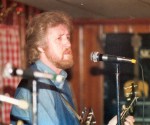 The first professional group I remember seeing there was Larry Sparks & his Lonesome Ramblers, featuring Kirk Brandenburger and Tommy Boyd, just about the time the John Deere Tractor album had been recorded. Our new group, Free Spirit, did an opening set and had the opportunity to interact with Larry and his band, a big thrill to me as a 17 year old aspiring to play professionally.
The first professional group I remember seeing there was Larry Sparks & his Lonesome Ramblers, featuring Kirk Brandenburger and Tommy Boyd, just about the time the John Deere Tractor album had been recorded. Our new group, Free Spirit, did an opening set and had the opportunity to interact with Larry and his band, a big thrill to me as a 17 year old aspiring to play professionally.
Over the succeeding months, the word spread, the crowd grew, and the little beer joint off the beaten path became nationally known by fostering an environment where the musicians knew they were coming to play for a knowledgeable and appreciative audience. Particular to bluegrass where there is more “offseason” than festival season, and before the proliferation of old movie theaters converted to concert venues supported by arts groups and government funding (all of which have been a boon to our music), there was a shortage of work for bands and Maxine, who handled the booking, was able to attract a Who’s Who list of talent.
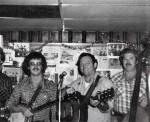 At the risk of leaving anyone out, here are some of the groups I recall visiting the Rose Garden: Doyle Lawson & Quicksilver (the original band), Spectrum (featuring Jimmy Gaudreau, Bela Fleck, Mark Schatz, and Glen Lawson), multiple visits by J. D. Crowe (featuring Keith Whitley, Steve Bryant, Gene Johnson, etc.), The Country Gentlemen (with Kent Dowell and Rick Allred), The Virginia Squires, The Lonesome River Band, Dave Evans with his first edition of River Bend, The Lost and Found, Summer Wages, The Bluegrass Cardinals — virtually everybody who was anybody in bluegrass, ofther than the Opry members (Bill Monroe, Jim & Jesse, The Osborne Brothers who had a good standby gig when not touring), played the Rose Garden.
At the risk of leaving anyone out, here are some of the groups I recall visiting the Rose Garden: Doyle Lawson & Quicksilver (the original band), Spectrum (featuring Jimmy Gaudreau, Bela Fleck, Mark Schatz, and Glen Lawson), multiple visits by J. D. Crowe (featuring Keith Whitley, Steve Bryant, Gene Johnson, etc.), The Country Gentlemen (with Kent Dowell and Rick Allred), The Virginia Squires, The Lonesome River Band, Dave Evans with his first edition of River Bend, The Lost and Found, Summer Wages, The Bluegrass Cardinals — virtually everybody who was anybody in bluegrass, ofther than the Opry members (Bill Monroe, Jim & Jesse, The Osborne Brothers who had a good standby gig when not touring), played the Rose Garden.
Just getting to see and hear these groups was great, but to be able to lean up against the juke box a few feet from the stage and watch these legends up close was unbelievable. It was fun, but more than that, what these experiences contributed to my development as a musician would be difficult to overestimate. Frequently, groups booked both Friday and Saturday nights, which gave me the opportunity to come back Saturday afternoon and hang out with my heroes.
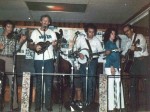 Maxine put her heart and soul into the Rose Garden, standing watch at the door two to four nights every week, year after year, making sure that the bands collected as much as possible for their long travels and hard work. As one who shared the same love for the music, and came every opportunity I could, we became good friends. I remember telling my dad that my first professional job would come as a result of Maxine’s connections and promotion. Sure enough, the first traveling group I joined was the Russell Brothers Boogie Grass Band (featuring later New South bassist Randy Hayes), and I became one of Larry Sparks’ Lonesome Ramblers for a short while (following Scott Vestal), both of which occurred as a result of Maxine’s recommendations.
Maxine put her heart and soul into the Rose Garden, standing watch at the door two to four nights every week, year after year, making sure that the bands collected as much as possible for their long travels and hard work. As one who shared the same love for the music, and came every opportunity I could, we became good friends. I remember telling my dad that my first professional job would come as a result of Maxine’s connections and promotion. Sure enough, the first traveling group I joined was the Russell Brothers Boogie Grass Band (featuring later New South bassist Randy Hayes), and I became one of Larry Sparks’ Lonesome Ramblers for a short while (following Scott Vestal), both of which occurred as a result of Maxine’s recommendations.
Throughout the 1980’s, the touring group that thrived at the Rose Garden was the Bluegrass Cardinals, in part because of their compelling rhythm, built on the bedrock of David Parmley’s guitar playing (ably assisted by bass players including Ernie Sykes, Ronnie Simpkins, Dale Perry, and others). This rhythm was appreciated by the dancers that hit the dance floor to the sound of fiddlers like world champion Tim Smith and Mark Hartgrove. I believe everyone considered them the “House Band,” as they performed there many times each year, and always packed the house.
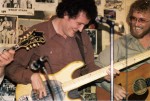 Their following in our area was such that they chose to host a Bluegrass Cardinals festival in Hurricane in 1983, organized with the assistance of Maxine Harmon.
Their following in our area was such that they chose to host a Bluegrass Cardinals festival in Hurricane in 1983, organized with the assistance of Maxine Harmon.
Larry Stephenson recently told me that he felt like everyone at the Rose Garden hated him when he replaced Norman Wright as a Cardinal, because the group had played there so often that it felt like a family member was gone and everyone loved Norman so much.
Some of the great memories of the Rose Garden I will always hold dear, in no particular order, are:
- Being invited to sub for Don Parmley as a Bluegrass Cardinal for a couple sets, with the version of the group that included Ernie Sykes, Norman Wright, Tim Smith and David Parmley (when I refused payment, Don gave me a copy of all of their albums, which worked to their advantage because I then bought every one that came out thereafter to keep my collection complete);
- Joining Lost and Found on stage multiple times;
- Shaking in my boots next to Doyle Lawson on stage;
- being honored by having musicians like Gene Parker and Alan Bibey spend their hard earned money to buy the first album my wife Valerie and I released;
- Telling high school senior Alan Bibey, performing with Kent Dowell and Bluegrass Blend, he’d better go to college because you can’t make a living playing Bluegrass (OK, maybe I was wrong);
- Having Tim Austin invite me out to his van during a break to listen to a pre-release copy of Old Country Town, which he then gave me;
- Running sound for the Country Gentlemen;
- Seeing musicians jump out of their skin when a dancer, usually my dad, would kick the trash can at the edge of the dance floor, making a loud crashing sound from the cans and bottles that filled the trash can. Wendy Miller told me recently that Crowe still makes fun of him for that (Wendy’s first appearance with the New South was at the Rose Garden).
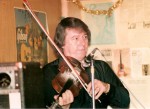 Unfortunately, as the old saying goes, “all good things must come to an end,” and the Rose Garden’s end came in the late 1980s after owners Troy and Connie divorced. Although it’s been more than 20 years since music was heard in that hallowed hall, I’d bet there are hundreds of fans and musicians who could share a story and a smile about the great music and good times they experienced there.
Unfortunately, as the old saying goes, “all good things must come to an end,” and the Rose Garden’s end came in the late 1980s after owners Troy and Connie divorced. Although it’s been more than 20 years since music was heard in that hallowed hall, I’d bet there are hundreds of fans and musicians who could share a story and a smile about the great music and good times they experienced there.
A fitting tribute would be a Rose Garden “Roll Call,” so I invite any readers, particularly musicians that played there, to share their recollections.
Who remembers the Rose Garden?

